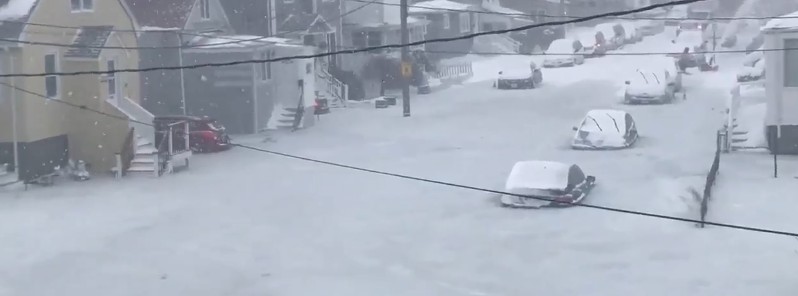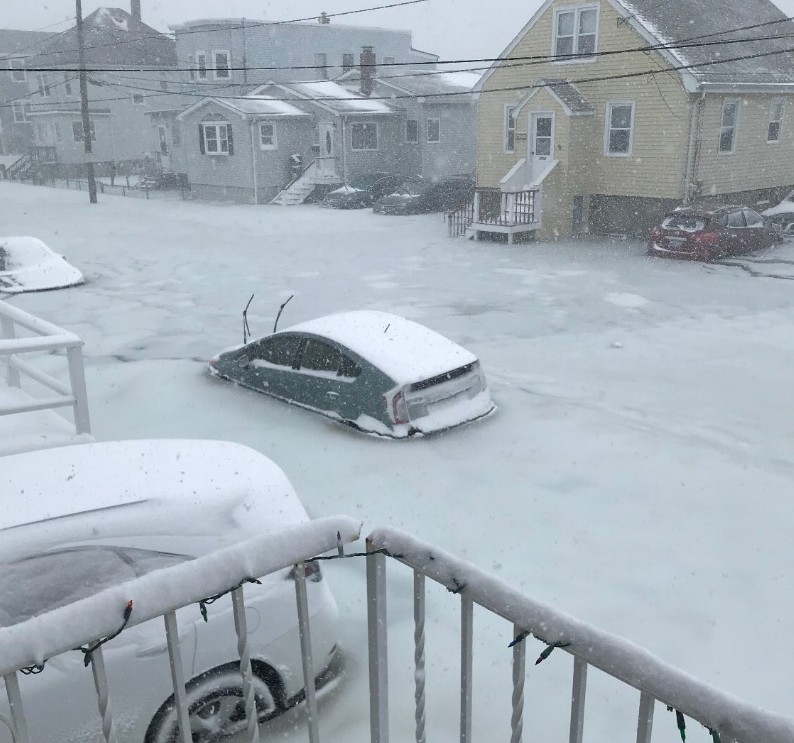Boston breaks the highest ever recorded tide, followed by frozen floods

Boston, Massachusetts has officially broken the highest ever recorded tide since 1921 as a major winter storm swept over the region on January 4, 2018. As the storm passed by, the winds shifted and brought viciously-cold winds from the northwest, turning flood water into ice in parts of the city.
The new record now stands at 12.39 cm (4.88 inches) MHHW or 28.50 cm (15.16 inches) MLLW (Mean Higher High Water/Mean Lower Low Water).
[OFFICIAL] Boston has broken the highest ever recorded tide since 1921. New Record: 4.88' MHHW (or 15.16' MLLW) on January 4th, 2018. Old Record: 4.82' MHHW (or 15.10' MLLW) during the Blizzard of '78. https://t.co/7qZNHVm0y5
— NWS Boston (@NWSBoston) January 5, 2018
NOAA meteorologist in Boston, Benjamin Sipprell, told The Daily Beast that the blizzard, combined with Thursday’s high tide between 12:00 and 13:00 EST – plus the extraordinary lunar event last month – meant that a flood was poised to take place.

Frozen flood – Boston, January 4, 2018. Credit: Dave Throup
"Leading up to the tide, we had hurricane-force winds and 20-foot [6 m] waves on coasts facing the Atlantic,” Sipprell said. “There was a 2- to 3-foot [60 – 90 cm] surge that got driven into inner bays and inundated a lot of infrastructure, roads, and basements into Nantucket.”
The result was catastrophic, with officials warning residents to stay off streets as the frigid temperatures would ice the water over and freeze vehicles to their locations.


HELPPP! #senditto7 #7News pic.twitter.com/9kaqbnnZVa
— Adam Abougalala (@Adam28691) January 4, 2018
"The storm will continue to bring heavy snow, strong winds, high surf, and dangerous travel conditions to much of northern New England into Friday, NWS said, and will 'pull away from the region later Friday and conditions will gradually improve.'
Very cold temperatures and wind chills will follow for much of the eastern third of the country through the weekend.
Featured image: Frozen flood in Boston, MA on January 4, 2018. Credit: Adam Abougalala

I very much like the plan about planting more trees. Instead of so much money invested in getting oil out of the ground, society needs to totally change and be way more interested in growing food and gardens.Life needs to become “old-fashioned” again. Maybe people need to be limited in how much gas they use per week. I am glad about Your post, Mr. Victor Rodin Juliane
Quote: “Boston destroys the highest recorded tide, followed by frozen floods.”
Reference. Today, warming raises the level of the world’s oceans. This is done by forest fires, the movement of continental water into the ocean, and other factors.
To save Boston, the whole of Massachusetts, by the way, and the city of New York, which is above the ocean level by only 9 meters, you need:
Eliminate global warming – I have such programs. Then Boston and the state will come to the state of the 80s of last century.
However, official America does not recognize warming, so it will not be eliminated.
There is a second option.
Boston begins to be friends with some country in the Gulf of Guinea – let it be Ghana.
Brief technical announcement.
The coast of Ghana is a magnificent climate. Boston arranges beaches along the entire coast, plus temporary accommodation for tourists, the elderly and families with children – this is understandable.
Within up to five kilometers to the north of the bay: health resorts, self-provided bunkers, elite accommodation for visitors, and local residents. Here channels will be laid, on both sides of which are planted forest plantations. Such a sequence – water – green plantations – completely exclude winds, and make the climate less hot and mild.
Within 5-20 kilometers, productive lands and pastures will be formed for the production of agricultural products, milk and meat, alternating with gardens and protective stripes, completely extinguishing the winds.
All electricity will be produced: the bulk – hydro power, the rest – from wind and solar energy.
Everything described above was for communication, recreation and tourism. Next is direct help to reduce the flooding of Boston. In the dry north of the countries of the Gulf of Guinea, including the southern territories of Mauritania, Mali and Niger, irrigated areas are formed on which new forests will be planted – up to 14 billion seedlings, and pastures for all species of animals inhabiting it. This is important for Boston. Quotation: “One adult tree stores up to 2.5 tons of fresh water in the root system. That is, earlier the open area evaporated all the moisture. Now the planted green desert keeps under trees 14 billion for 2.5 tons – 35 billion tons of water!
I believe that the experience of Boston will be adopted in a year. And we will get two results: The development of the arid territories of Africa, and the salvation of cities subject to flooding.
Sincerely, developer of environmental programs, Victor Rodin. Ukraine. (Khmelnitsky NPP). Tel. Kiev Star: 961336344. Addresses on the Internet: rodin.vik@yandex.ua, dorosydos@gmail.com.
The cars with the wipers up… the irony! LOL